The Security State
The People In Charge telling us that something is Necessary For Our Own Good makes a large number of people accepting of the inconvenience, no matter how asinine or unsupported by evidence.
Kevin Drum engages in an anti-anti-TSA rant, arguing that all of us educated white-collar professionals whining about invasive airport security procedures which are “pretty clearly directed at improving the security of air travel.” Besides, he points out, if you think things are bad now, just wait until you see how much worse they get if another plane goes down!
Matt Yglesias sympathizes with the idea that “public outrage about the indignities it imposes seems to me to be 80 percent middle class white people not liking the idea of being placed in the subordinate position of a dominance hierarchy” but rejects the rest of the argument. Indeed, he contends, “America as a whole is, I think, over-secured against terrorist[s] by this kind of weapon screening.”
One should back up and consider the baseline. If you assume the existence of a person willing to die for Osama bin Laden’s war on America, located within the United States of America, and in possession of a working explosive or firearm, there’s basically nothing stopping him from blowing up the 4/5/6 platform at Union Square or the 54 bus in DC or the Mall of America or even the security line at DFW airport. And yet it doesn’t happen. Does that mean we could get by with no security anywhere? I say: no. But we should start with the idea that the main point of security is simply to push attacks around. The bank has security guards to encourage you to rob the liquor store down the street.
[…]
The public choice argument that the government will over-invest in the security of its own facilities and personnel is strong. Airplanes, in this spirit, seem more vulnerable to attack than buses and deserve tougher security. But don’t ask yourself “what amount of hassle and expenditure is worth paying to prevent terrorist attacks,” ask yourself “what amount of hassle and expenditure is worth paying to shift terrorist attacks off airplanes and onto buses”? Much of the resources currently spent on “security” measures would be much better spent on having more police officers. Ordinary violent crime continues to be a very serious problem in America, and reducing its incidence would vastly improve people’s physical security and free up investigatory resources to make serious plots harder to pull off.
Chad Orzel believes that, aside from rationality and liberty, another casualty of all this is the “corrosive effect that silly and inconvenient policies have on people’s attitude to authority.”
If you want a more airplane-specific analogy, think about the ban on electronic devices during take-off and landing. On every flight, they make an announcement sternly warning you that you can’t listen to your iPod until some arbitrary altitude has been reached, despite the fact that there is no significant increase in risk from a passenger having music playing during the start and end of the flight. I know this, because I always blow off that announcement, and listen to my music through the forbidden stretches of the flight.
The net effect of that policy is not to make the plane any safer, but to make me and many other passengers more cynical about airline policies in general. It lowers my opinion of the flight attendants who enforce the stupid and pointless rules, and makes me less inclined to believe anything else they say.
While some of us are indeed cynical, though, most will comply simply because they’re told to. And the incentives all point in the direction of imposing more rules, rather than abolishing the stupid ones. First, as Thoreau notes,
If you value safety over freedom and sanity, if you crave the illusion of 100% security even at the cost of trillions of dollars, interminable hassle, and real people killed or locked in gulags, then the points made by Chad and Matt are irrelevant to you. Sadly, too many people in our culture seem to feel that way. Or at least they won’t question policies based on such presumptions.
Second, and perhaps more importantly, the bureaucratic inertia is all in that direction. Ezra Klein makes a point I’ve been harping on for years:
The bureaucratic incentives of airport security all point in one direction: toward more of it. You can’t be the director of homeland security who decreed that passengers could keep their sneakers on and then watched a terrorist finally get a shoe bomb to work at 33,000 feet. You can’t be the director of homeland security who knows that three terrorists tried to mix a liquid explosive on a flight and then did nothing to stop them from trying it again. It’s bad to be blamed for annoyances. It’s much worse to be blamed for deaths. And the voters can’t credibly promise to hold the security state blameless for an actual terrorist attack. So the security state, and the people who run it, won’t take the chance.
Aside from a bureaucratic mindset that focuses on only one goal — preventing terrorist attack — without much regard for the fact that it detracts from several other goals — efficiency in time and money, dignity, liberty, and so forth — there’s the fact that the public will doubtless overreact in the event of a successful terrorist attack. But it’s also the case that the mere fact that The People In Charge tell us that something is Necessary For Our Own Good makes a large number of people accepting of the inconvenience, no matter how asinine or unsupported by evidence.
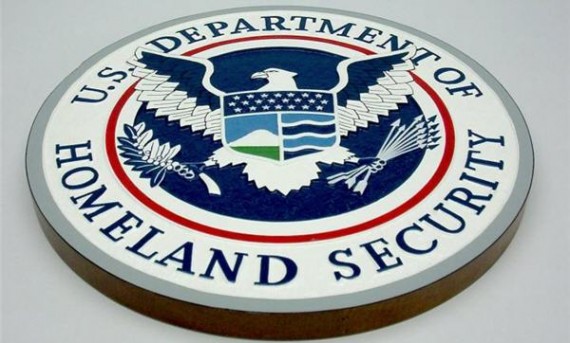

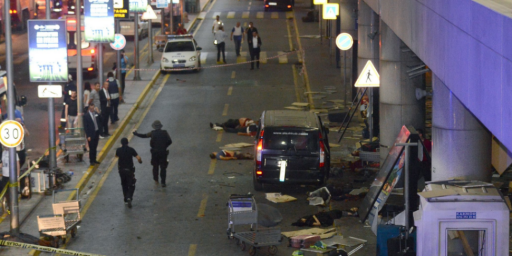
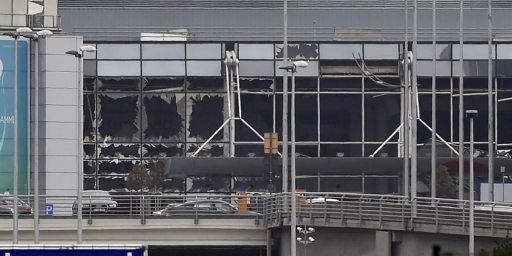
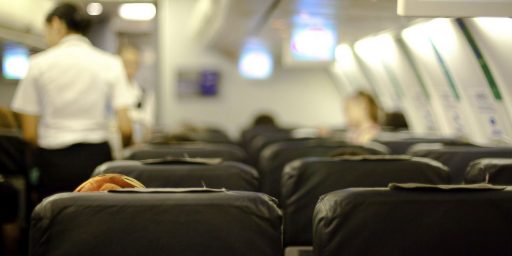
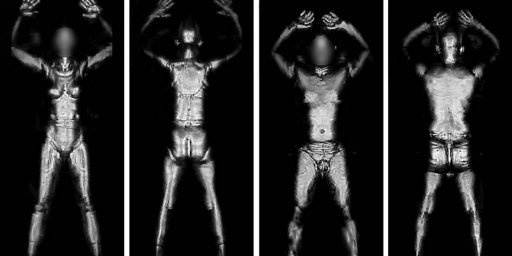

I don’t think you have made your case, which seems to be that we are all suffering from some slave mentality. Its easy to rant about security theater, and essentially demand to be given proof that a particular measure has actually saved lives. You seem to be operating under the assumption that anything the government does is bound to be wasteful, useless, and tyrannical unless proven otherwise. I think that is rather irrational. I wouldn’t necessarily go to the other extreme and claim that procedures could never be bad in those ways unless proven to be so – but a more balanced approach seems wise. In all the blather about this issue, I have not seen any convincing evidence that the procedures are useless – only repeated fact-free assertions. People who rant about “theater’ for example, yet never even address the deterrance effect.
So I think that the staunch opponents like yourself are every bit as resistant to evidence as any staunch supporter of these measures. Probably both sides might reach a point where a weight of evidence will have an effect, but failing something dramatic, this argument does not advance much beyond the foxholes from which it starts.
Government officials obviously do not want to be blamed for a disaster, but part of that comes, no doubt, from a sincere desire that there be no disasters in the first place. I am sure they take seriously the mission to defend the country. And, as you correctly point out, it seems that the people out there who vote see the provision of security as exactly the thing they want their government to do. Of course, just like high spending with no taxes, I am sure they want complete security without any inconveniences at all.
What I see, overwhelmingly, from the critics are not reasoned discussions of appropriate security measures, but rather ranting and posturing – which seems to be more about venting personal issues than finding appropriate solutions to the issue of terrorism, and how it affects our lives. For example…
This kind of whiny stupidity is so typical of the reactions to these issues. No one has ever asserted that listening to your iPod is a danger. There are, however, many types of handheld electronic devices that can interfere with radio transmissions at altitudes and proximities to airports where such interferences can be very dangerous. So, rather than have the flight attendant be responsible for stopping to examine every device to check to see if it has a transmission function, or whether it is on, the passengers are asked to shut all devices off for five minutes or so. Oh, but this is some outrageous imposition on our liberty. I am going to be such a rebel – move over Patrick Henry, I’m keeping my iPod on! A lot of people need to grow up a bit.
I thinks it’s a good starting position. Freedom should be the default position, with restrictions on it imposed by government only when Constitutionally permissible and reasonable. Patting down grandma and 6-year-olds on the incredibly off chance they’re terrorists is simply unreasonable.
I don’t see that that principle somehow determines that anything the government does is more likely than not to be wasteful, useless or tyrannical. Your principle speaks to the scope of allowable government action, not the efficiency or efficacy of any particular procedure.
Could I assume that you would be in favor of a pat down, may even insist on it, if the subject were a young man of middle eastern appearance, clutching some beads while chanting about how great Allah is, and seeming to have unnatural bulges under his clothes?
If so, fine. We are beyond the question of whether there are Constitutional issues involved here. Whether you have any less of a slave mentality than others. Its just a matter of degree – of judgment, as to who will be subject to a pat-down or a scanner, and who will not.
I guess your position would be to give those TSA agents whom you despise full authority to make these judgments?
@Tano
My position isn’t that whatever government does is evil. Rather, it’s that when government intrudes on our liberty, the burden is on them to establish the need. “Trust us,” we’re looking out for you, is insufficient because of the bureaucratic pressures outlined in the piece.
A more sane security regime would require better paid and trained officers. I don’t despise the current crop; I just view them as overburdened mall cops doing a lousy job for too little pay and with too much power.
Is there any way we can set up two airline systems, one for people who desire freedom and one for the people who piss their pants at night?
As a somewhat liberal I also start from the position that the government needs to justify its intrusions and limits on our liberty. But I add — and conservatives generally don’t — that corporations have the same obligation. In other words, government isn’t the only potential perp needing a pat-down, the corps are also suspects.
I’ve been saying for about 20 years now that if we seriously wanted airport security we’d hire retired street cops and empower them to ask a few questions. That in effect is what the Israelis do. Humans are better at this than machines.
I’ve been saying for about 20 years now that if we seriously wanted airport security we’d hire retired street cops and empower them to ask a few questions. That in effect is what the Israelis do. Humans are better at this than machines.
Indeed, but Israel’s system is very expensive, and they have far, far fewer air travelers pass through their airports than we do, so the powers that be decided cheap manpower plus whatever new technology they could get their hands on while enriching themselves (Chertoff) was the way to go. So here we are. Fancy new expensive technology that is little more, effectiveness-wise, than a super-expensive metal detector, adding very little to our security, along with an army of undertrained, underpaid rent-a-cops who aren’t even allowed enough agency to determine a possible threat from a six year old boy and his grandma, but are given orders to grab every third crotch they see. Wonderful.
Separate planes – not a bad idea. “Shaking” and “Non-Shaking”. Those willing to accept the current million or so to one odds of an incident get to go through reasonable document and property checks for their flight. Those that don’t get a free proctological assessment and one million and one to one odds on their flight.
It’s almost amusing (almost) to see the general public complain about intrusive government bureaucrats. Try being a business. What many call theater being perpetrated by the TSA is a commonplace occurrence when conducting commerce. Most citizens never deal with the various army of regulatory enforcement personnel who regularly harass citizen merchants but they’re getting a taste of it.
And yet, How many Republicans were accepting of the torture of “terrorists”, “no matter how asinine or unsupported by evidence” or the efficacy of it???
(I am looking at you James… I seem to recall you saying that there were times when it could be acceptable) (KSM?) (If I am wrong??? my apologies)
And yet, now that the great white race is being subjected to these indignities… (“HOW DARE you search me! I am not a Muslim!” Quoth T Mcveigh (and who knows who else with an american sounding name.)
Grandma is senile and will carry anything if you tell her it was her father’s watch, and the 6 yr old will do whatever you tell them to if they think it is a game and there is candy at the end of it….
James, you are intelligent. And it may well be unreasonable, BUT… in less than 5 seconds I thought of 2 scenarios where searching grandma and little Suzy were reasonable. Why could not you?
I repeat: Flying is not a right. It is not in the constitution and besides all of which, we are physically incapable of it. Driving is not a right either. That is why DWB is a good reason for getting pulled over.
Suddenly, it is hapening to white people. And that is an inconvenience. Welcome to my world MF’ers. And no, I don’t give a rats ass about the indignities inflicted upon you.Deal with it.
PS: if you don’t like it, don’t fly. After all, that is what we were told in Alabama back in 1964… “Don’t like it here? Don’t come. ”
This is essentially Robert Higgs’ thesis and the implication is quite clear. We will keep on getting more and more security. Note that in this case, the threat that has prompted much of this was one that could have been prevented by other means: i.e. using the do-not-fly lists for what they are actually intended.
Corporations generally don’t have the same power as the government. A government is a human institution that claims the monopoly of the legitimate use of physical force within a given territory. … The state is considered the sole source of the `right’ to use violence.(Politics as a Vocation,” Max Weber, in “From Max Weber: Essays in Sociology,” edited by C. Wright Mills, Oxford University Press, NY, 1946, p. 78)
That isn’t to say that large corporations don’t pose their problems, especially when they have access to policy makers at the highest levels…
Oh and Mantis is right, the reason the Israeli system wont work here is the costs. Israel is much smaller, so flying isn’t nearly as frequent.
> That isn’t to say that large corporations don’t pose their problems, especially when they have access to policy makers at the highest levels…
Or in the case of Fox, employ them. I think Murdoch has decided lobbying is an unnecessary cost. Cut out the middleman and have the politicians work directly for him…
> citizen merchants
Wow, new buzzword. Did they teach you that at in a”tea party American” class? Do you get a secret decoder ring too?
Agree with that. Removing the idea that corporations are more than a type of organisation would be a good start … granting them some of the rights and privileges of people is a huge mistake, and allows them to avoid responsibility.
HMMMMM…..
No reply to my post above, and yet suddenly I am blocked from commenting on a similar thread above this one (with a most innocent comment)…
James, I know you to be immensly fair… what’s up?
and you know what? I am severely dissapointed in you people. I hit on every “dog-whistle” topic in that comment and NONE of you replied. Geeeeezzzzze….
Maybe I was right? In a way you could not deny????
Apparently, “tone deafness” with a hyperlink triggered the spam filter, which is especially sensitive to pharmaceutical ads. Otherwise, Thanksgiving-eve festivities tend to lessen blog traffic and responses to comments.
Otherwise, yes, there are conceivable ways that bombs could be hidden on grandmothers and children. That doesn’t make searching them reasonable.
And I’ve never understood the “right” vs. “privilege” canard that’s so often trotted out. Yes, the state can regulate, say, the right to fly a plane or drive a car in the interests of public safety. There’s an obvious clear and present danger to having someone behind the wheel without proper training or who’s physically or mentally incapable of the task. The same is not true for being a passenger.
And I’m not sure how indignities visited on blacks before I was born justifies indignities visited on the flying public now.